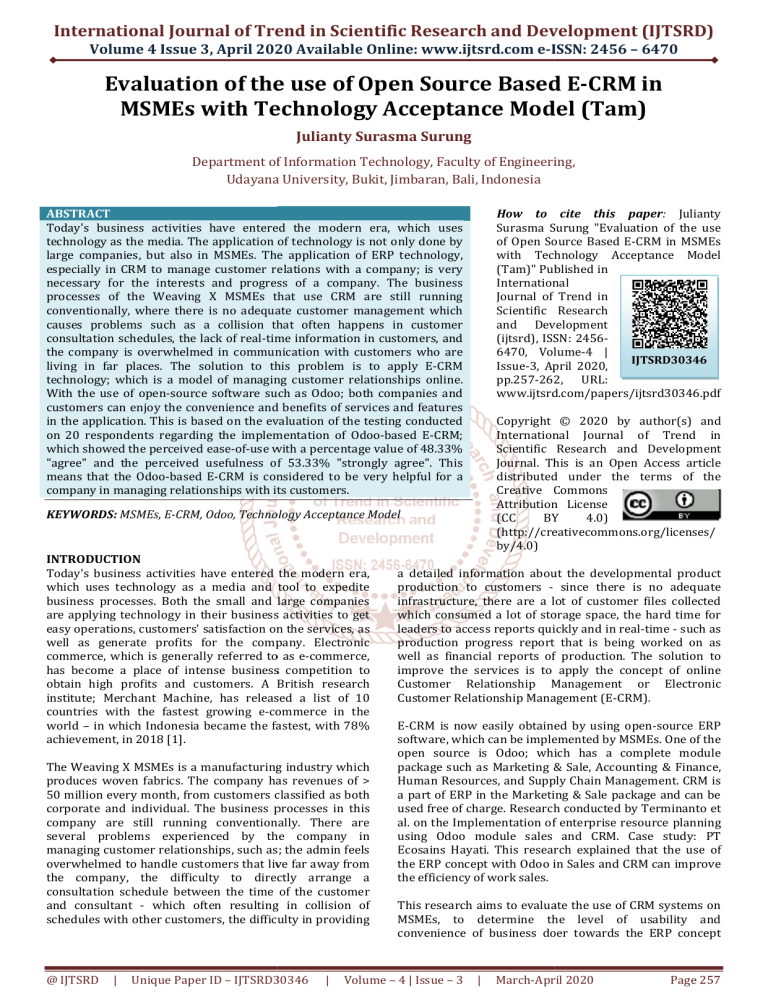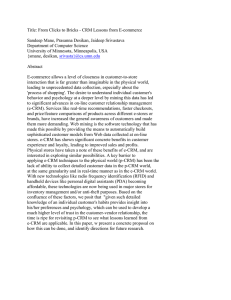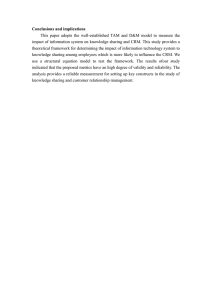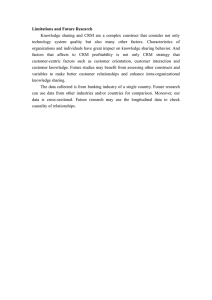
International Journal of Trend in Scientific Research and Development (IJTSRD)
Volume 4 Issue 3, April 2020 Available Online: www.ijtsrd.com e-ISSN:
ISSN: 2456 – 6470
Evaluation of the
he use off Open Source Based E-CRM in
MSMEs with
ith Technology Acceptance Model (Tam)
Julianty Surasma Surung
Department off Information Technology, Faculty of Engineering,
neering,
Udayana University, Bukit
Bukit, Jimbaran, Bali, Indonesia
ABSTRACT
Today's business activities have entered the modern era, which uses
technology as the media. The application of technology is not only done by
large companies, but also in MSMEs. The application of ERP technology,
especially in CRM to manage customer relations with a company; is very
necessary for the interests and progress of a company. The business
processes of the Weaving X MSMEs that use CRM are still running
conventionally, where there is no adequate customer m
management which
causes problems such as a collision that often happens in customer
consultation schedules, the lack of real-time
time information in customers, and
the company is overwhelmed in communication with customers who are
living in far places. The solution
tion to this problem is to apply E
E-CRM
technology; which is a model of managing customer relationships online.
With the use of open-source
source software such as Odoo; both companies and
customers can enjoy the convenience and benefits of services and features
in
n the application. This is based on the evaluation of the testing conducted
on 20 respondents regarding the implementation of Odoo
Odoo-based E-CRM;
which showed the perceived ease-of-use
use with a percentage value of 48.33%
"agree" and the perceived usefulness of 53.33% "strongly agree". This
means that the Odoo-based E-CRM
CRM is considered to be very helpful for a
company in managing relationships with its customers.
How to cite this paper: Julianty
Surasma Surung "Evaluation of the use
of Open Source Based E-CRM
E
in MSMEs
with Technology Acceptance Model
(Tam)" Published in
International
Journal of Trend in
Scientific Research
and Development
Develop
(ijtsrd), ISSN: 24562456
6470, Volume-4
Volume
|
IJTSRD30346
Issue-3,
3, April 2020,
pp.257-262,
262, URL:
www.ijtsrd.com/papers/ijtsrd30346.pdf
Copyright © 2020
20
by author(s) and
International Journal of Trend in
Scientific Research and Development
Journal. This is an Open Access article
distributed under the terms of the
Creative Commons
Attribution License
(CC
BY
4.0)
(http://creativecommons.org/licenses/
by/4.0)
KEYWORDS: MSMEs, E-CRM,
CRM, Odoo, Technology Acceptance Model
INTRODUCTION
Today's business activities have entered the modern era,
which uses technology as a media and tool to expedite
business processes. Both the small and large companies
are applying technology in their business
ess activities to get
easy operations, customers' satisfaction on the services, as
well as generate profits for the company. Electronic
commerce, which is generally referred to as ee-commerce,
has become a place of intense business competition to
obtain high
h profits and customers. A British research
institute; Merchant Machine, has released a list of 10
countries with the fastest growing e-commerce
commerce in the
world – in which Indonesia became the fastest, with 78%
achievement, in 2018 [1].
The Weaving X MSMEs is a manufacturing iindustry which
produces woven fabrics. The company has revenues of >
50 million every month, from customers classified as both
corporate and individual. The business processes in this
company are still running conventionally. There are
several problems experienced
rienced by the company in
managing customer relationships, such as; the admin feels
overwhelmed to handle customers that live far away from
the company, the difficulty to directly arrange a
consultation schedule between the time of the customer
and consultant - which often resulting in collision of
schedules with other customers, the difficulty in providing
@ IJTSRD
|
Unique Paper ID – IJTSRD30346
30346
|
a detailed information about the developmental product
production to customers - since there is no adequate
infrastructure, there are a lot of customer
custome files collected
which consumed a lot of storage space, the hard time for
leaders to access reports quickly and in real-time
real
- such as
production progress report that is being worked on as
well as financial reports of production. The solution to
improve the
he services is to apply the concept of online
Customer Relationship Management or Electronic
Customer Relationship Management (E-CRM).
(E
E-CRM
CRM is now easily obtained by using open-source
open
ERP
software, which can be implemented by MSMEs. One of the
open sourcee is Odoo; which has a complete module
package such as Marketing & Sale, Accounting & Finance,
Human Resources, and Supply Chain Management. CRM is
a part of ERP in the Marketing & Sale package and can be
used free of charge. Research conducted by Terminanto
Terminan et
al. on the Implementation of enterprise resource planning
using Odoo module sales and CRM. Case study: PT
Ecosains Hayati. This research explained that the use of
the ERP concept with Odoo in Sales and CRM can improve
the efficiency of work sales.
This
his research aims to evaluate the use of CRM systems on
MSMEs, to determine the level of usability and
convenience of business doer towards the ERP concept
Volume – 4 | Issue – 3
|
March-April
April 2020
Page 257
International Journal of Trend in Scientific Research and Development (IJTSRD) @ www.ijtsrd.com eISSN: 2456-6470
contained in Odoo. Furthermore, this research tries to find
out whether the CRM system contained in Odoo can fulfill
the needs of MSMEs, and management of customer
relationships can be helped; so that the leader of a
company can choose the right decision to improve the
company's services to its customers.
RELATED WORKS
Research conducted by Tuomas Laakso discussed the
implementation of CRM software on MSMEs. The result of
research on determining CSF in implementing CRM is one
of the factors, which is training on the users to operate the
system. Furthermore, this research emphasized that each
CRM implementation is different in terms of company size,
needs, business fields, and others. Also, it is difficult to give
concrete advice about what specific software must be
obtained by a company; because it is very dependent on
the situation [2].
Research conducted by Rini Asmara and Imam Gunawan
discussed the implementation of web-based CRM. This
research showed a new system implementation research;
make companies be able to interact and make
relationships with customers easier; previously
conventional interactions are changed into electronic
media by making information systems based on E-CRM
(Electronic Customer Relationship Management) [3].
Research conducted by Terminanto discussed sales and
CRM implementation using Odoo. The result showed that
the implementation of the ERP system can improve the
efficiency of work sales, and features on Odoo can fulfill
the needs of users [4].
RESEARCH METHOD
Some elements which became the main key of the method
in this study are the survey and assessment method. The
type of data in this study used a primary data type; which
means that the data was obtained directly from the source
by distributing an electronic questionnaire (Google Form).
The survey was conducted in several MSMEs and students
who have ever used CRM.
A. Research Instrument
The research instrument is a tool used in research for data
collection [5]. The research instrument used in this study
was a questionnaire. The questionnaire contains the
respondent's identity and several questions arranged in a
structured manner using a Likert scale to find out the
user's perception of Perceived Usefulness and Perceived
Ease-of-Use.
Table1. Questionnaire
No.
Statement
1
Response
2 3 4 5
Perceived Uselfuness
1
Using E-CRM at work will allow me to complete tasks faster
2
Using E-CRM will improve my work performance
3
Using E-CRM at work will increase my productivity
4
Using E-CRM will increase utilization in my work
5
Using E-CRM, it will be easier to do my work
6
I feel happy that E-CRM is useful in my work
Perceived Ease Of Use
7
E-CRM management is easy to learn
8
I am easily pleased to do what I want with E-CRM
9
My talk with E-CRM is very clear and understandable
10
I agree that using E-CRM is very clear and understandable
11
I became trained in using E-CRM
12
I am happy that E-CRM is easy to use
1.1. Validity Test
A validity test was used to determine the level of validity of each question in a questionnaire. Validity is a measurement
that shows the level of validity of an item/instrument. The items/instruments are considered valid if they can do and
measure what they should[5]. Validity test is carried out on all questions in the questionnaire - by correlating the score of
each item with the total score, using the Pearson Correlation (Pc) technique. The value of Pc found will then be compared
with the value of r-table; where, if the value of Pc is greater than r-table (Pc > r-table), then the question (item) is
considered valid [6].
1.2. Reliability Test
Measurements are considered reliable if they get the same fixed results from the symptoms of unchanged measurements
conducted at different times. Reliability is an index that shows the extent to which a measuring device can be trusted. It
can also be said that reliability shows the consistency and stability of a measurement scale by using Cronbach's alpha
value on the result of the analysis[6].
B. Questionnaire Data Analysis
Descriptive analysis is an analysis of the structure of the research instrument, where the analysis is carried out based on
the results of the respondents' statements on each item in each indicator. This descriptive analysis data is presented in the
form of tables and diagrams. The filling out of the questionnaire is also determined by using a likert scale of 1-5; Where 1 =
Strongly Disagree, 2 = Disagree, 3 = Neutral, 4 = Agree. 5 = Strongly Agree.
@ IJTSRD
|
Unique Paper ID – IJTSRD30346
|
Volume – 4 | Issue – 3
|
March-April 2020
Page 258
International Journal of Trend in Scientific Research and Development (IJTSRD) @ www.ijtsrd.com eISSN: 2456-6470
THEORETICAL FRAMEWORK
Literature review contains supporting theories in the research to be conducted. These theories include MSMEs, E
E-CRM,
Odoo, and TAM.
1. Micro, Small and Medium Scale Enterprises (MSMEs)
According to the Law of the Republic of Indonesia Number 20 Year 2008 Concerning Micro, Small and Medium Scale
Enterprises Paragraph 6 [8], can be described as follows:
1.1. Criteria for Micro Business:
Having a net asset of no more than Rp 50,000,000 (fifty million rupiahs) excluding land and buildings for business
premises; or Having annual sales of no more than Rp.300,000,000.00 (three hundred million rupiahs).
1.2. Criteria for Small Business are as follows:
Having a net asset of more than Rp 50,000,000 (fifty million rupiahs) up to a maximum of Rp 500,000,000.00 (five
hundred million rupiahs) excluding land and buildings for business premises; or Having annual sales of more than Rp.
300,000,000.00 (three hundred
red million rupiahs) up to a maximum of Rp. 2,500,000,000.00 (two billion five hundred
million rupiahs).
1.3. Criteria for Medium Business are as follows:
Having a net asset of more than Rp.500,000,000.00 (five hundred million rupiahs) up to a maximum of
Rp10,000,000,000.00 (ten billion rupiahs) excluding land and buildings for business premises; or Having annual sales of
more than Rp. 2,500,000,000.00 (two billion five hundred million rupiahs) up to a max
maximum
imum of Rp 50,000,000,000.00
(fifty billion rupiahs).
2. Electronic Customer Relationship Management (E
(E-CRM)
In general, CRM is a tool needed to quickly gather relevant data and identify the most valuable customers from time to
time. E-CRM is a form of customer
mer management carried out by the use of information technology. E
E-CRM also helps
companies to obtain and store customers' data, as well as to conduct two
two-way
way relationships. Until today, E-CRM
E
has
already developed with an emphasis on changing policies and procedures, which designed to increase sales and customer
retention[3].
3. Odoo
Odoo is an ERP application that is open source and fully integrated (Terrminanto). Odoo Software contains all ERP
concepts, including Marketing & Sale (M / S), Accounting & Finance (AF), Supply Chain Management (SCM) and Human
Resources (HR). E-CRM
CRM is a part of Odoo that is included in the concept of Marketing
& Sale, which has the function of managing data and customers’ relationships with the company [7].
4. Technology Acceptance Model (TAM)
Testing to assess the perceived
ed usefulness is done by many methods; one of the most influential is the Technology
Acceptance model [8].. According to TAM, the main factor that led to the intention to use technology is perc
perceived
usefulness (PU) and perceived ease-of-use
use (PEOU). In the use of TAM, PU measures the extent to which users trust the
technology used to improve their work, and PEOU measures the extent to which users feel confident that it will be easy to
use the technology. TAM testing is also carried out by applying the likert scale for each question, which is worth 1
1-5; from
left to right. The research of Jamer R Lewis [9] discussed assessing the possibility of technology acceptance using item
format by determining the amount of direction. The higher the result from left to right, the better it will be.
RESULT AND DISCUSSION
This research evaluated the use of E-CRM
CRM produced by Odoo, where MSMEs with conventional business processes can
facilitate company and employee performance in managing customer relationships.
Fig1.. The Display of the CRM module on Odoo
@ IJTSRD
|
Unique Paper ID – IJTSRD30346
30346
|
Volume – 4 | Issue – 3
|
March-April
April 2020
Page 259
International Journal of Trend in Scientific Research and Development (IJTSRD) @ www.ijtsrd.com eISSN: 2456-6470
Customer Relationship Management on Odoo is a module intended for customer relationship management. The company
can see the opportunity for sales, manage it into several stages, and analyze sales results. The CRM module also has a
calendar feature that helps companies to determine the schedule of meetings with potential customers. This Odoo CRM
module is integrated online and offline. The Customer Relationship Management module has several sections including
Leads, Pipeline, and Quotations. Leads is the process where companies collect relevant data about potential customers that
provide profits to the company and make them a regular customer of the company. Pipeline is a collection of activities
conducted by a company to its customers; such as bid requests, bids received by the company, bids that are being worked
on and offers which have been completed.
1. Questionnaire Testing
Based on the results of the questionnaire distributed to 20 people with a statement consisting of PEOU and PU - covering
18 questions; the following validity test results were obtained.
Fig2. The Display of the Correlation of Questionnaire Result
@ IJTSRD
|
Unique Paper ID – IJTSRD30346
|
Volume – 4 | Issue – 3
|
March-April 2020
Page 260
International Journal of Trend in Scientific Research and Development (IJTSRD) @ www.ijtsrd.com eISSN: 2456-6470
Based on the formula, it is known that r table is 0.444. From here, it can be seen that all answers to the questionnaire are
valid; where the biggest calculation result is 0.927, wh
while
ile the smallest is 0.427. This value is greater than the result of the
calculation of the value of r.
After the validity test is conducted, the next step is the reliability test - which is based on the value of Cronbach's alpha; if
the value is greater than
han 0.6, then it is considered reliable. The reliability test results are as follows figure 3.
Fig3. Reliability Test Results
The answer to the questionnaire is 0.905. It can be said that the questionnaire can be trusted.
2. Descriptive Testing
Based on the questionnaire; it gives a result of a percentage of each aspect by using the following formula.
𝑃 × 100
𝑌=
𝑄 ×𝑅
Information:
Y = Percentage value
P = The number of respondents' answers per variable
Q = The number of respondents
R = The number of questions
Item PUS
1
2
3
4
5
6
Amount
%
Table2. Recapitulation of PU Value
1
2
3
4
5
0
0
0
11
9
0
0
0
9
11
0
0
4
8
8
0
0
1
8
11
0
0
1
9
10
0
0
4
7
9
0
0
10
52
58
0
0
8,33 43,33 48,33
Table
Table3. Recapitulation of PEOU Value
Item PEOU
1
2
3
4
5
1
0
0
0
15
5
2
0
0
0
11
9
3
0
0
0
9
11
4
0
0
0
9
11
5
0
0
0
11
9
6
0
0
0
9
11
Jumlah
0
0
0
64
56
%
0
0
0
53,33 46,67
Based on the answers from respondents, it can be seen
that for the perceived ease-of-use,
use, the respondent gives
the highest average percentage of 48.33%; which means
that the respondent considers that Odoo--based E-CRM is
easy to use. While for the perceived usefulness, the
percentage is 53.33%, which means that Odoo
Odoo-based ECRM is considered useful in its use.
CONCLUSION
The respondents' perceived ease-of-use
use gave the highest
average percentage of 48.33% "agree", which means that
@ IJTSRD
|
Unique Paper ID – IJTSRD30346
30346
|
Amount
20
20
20
20
20
20
120
91,67
Amount
20
20
20
20
20
20
120
100
the respondents considered that Odoo-based E-CRM is
easy to use - while for the perceived usefulness, the
percentage is 53.33% "strongly agree", which means that
Odoo-based E-CRM
CRM is considered useful in its use. OdooOdoo
based E-CRM
CRM is considered very helpful for companies to
manage relationships
ationships with their customers. For future
researches, it is expected to evaluate in terms of the
security of open source applications for the E-CRM
E
used,
as well as integration with other parts of the company
such as accounting, production, and inventory.
inventory
Volume – 4 | Issue – 3
|
March-April
April 2020
Page 261
International Journal of Trend in Scientific Research and Development (IJTSRD) @ www.ijtsrd.com eISSN: 2456-6470
REFERENCES
[1] “Saturated Sectors: Finding Gaps In The Ecommerce
Market In 2020,” Merchant Machine, 2019. [Online].
Available:
https://merchantmachine.co.uk/saturated-sectors/.
[2] T. Laakso, “Customer Relationship Management
Software Implementation in SMEs,” no. February,
2017.
[3] R. Asmara and I. Gunawan, “IMPLEMENTASI
ELECTRONIC
CUSTOMER
RELATIONSHIP
MANAGEMENT (E-CRM) BERBASIS WEB PADA
CV.PUPLAS.COM”,” J. Sains dan Inform., vol. 4, no. 1,
pp. 46–52, 2018.
[4] A. Terminanto, R. Hidayat, and A. N. Hidayanto,
“Implementation of enterprise resource planning
using Odoo module sales and CRM. Case study: PT
@ IJTSRD
|
Unique Paper ID – IJTSRD30346
|
Ecosains Hayati,” in IOP Conference Series: Materials
Science and Engineering, 2017.
[5] Sugiyono,
Metodologi
Kualitatif, dan R&D. 2016.
Penelitian
Kuantitatif,
[6] E. P. Kusumah, Olah Data Skripsi Dengan SPSS 22.
2016.
[7] Noprianto, W. Budhysantika, and Widoyo, Dasardasar OpenERP: Sisi Teknikal Dan Cotoh Kasus. 2014.
[8] F. D. Davis, “User acceptance of information
technology: system characteristics, user perceptions
and behavioral impacts,” Int. J. Man. Mach. Stud., vol.
38, no. 3, 1993.
[9] J. R. Lewis, “Comparison of four TAM item formats:
Effect of response option labels and order.,” J.
Usability Stud., 2019.
Volume – 4 | Issue – 3
|
March-April 2020
Page 262




